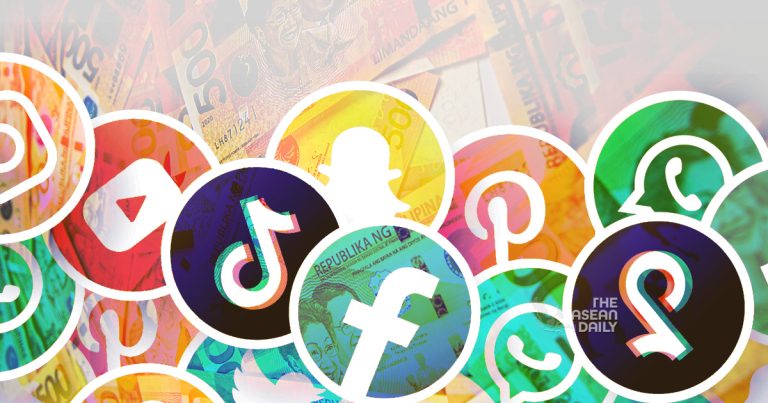3-8-2023 (MANILA) The 2022 Philippine presidential election was historic in many ways. For the first time, the son of a former dictator won the presidency decisively. Ferdinand “Bongbong” Marcos Jr, son of late dictator Ferdinand Marcos who ruled the Philippines for 20 years until his ouster in 1986, won the election by a wide margin against his closest opponent, Leni Robredo.
While Marcos’ victory could be attributed to many factors, one stands out – the rise of social media influencers and disinformation campaigns on platforms like Facebook, YouTube and TikTok.
Recent studies have shown the extensive use of social media by the Marcos campaign to burnish the family name and image through historical revisionism. A study by Internews Philippines estimated that candidates in the 2022 elections spent between P600 million to P1.5 billion on online influencers to conduct covert campaign operations. Out of this, Marcos was estimated to have spent the most – around P351 million across platforms.
YouTube emerged as the most potent platform, with its video format allowing influencers to rewrite history and spread disinformation more easily. One study found 587 YouTube channels engaged in partisan influencing for candidates like Marcos. With millions of followers, they churned out hyperpartisan content on trending topics, allowing their channels to be recommended more on the platform.
On TikTok, political influencers used trending hashtags and lifestyle, feel-good content to whitewash the Marcos family’s image. Facebook remained a hotbed of fake news and disinformation, with influencers sharing content from known disinformation sources. Twitter saw organised attacks against opposition candidates by influencers.
Overall, researchers identified over 1400 influencer accounts across platforms dedicated to covert campaigning for the 2022 elections. Their reach and impact shouldn’t be underestimated. Surveys show Filipinos have an extremely high trust in social media and are the top consumers of influencer content globally. A 17 million strong diaspora community was also targeted.

The Marcos strategy went beyond paid trolls and into sophisticated influence operations designed to rewrite history in his favor. This was facilitated by gaps in electoral laws around social media campaigning and a lack of accountability for tech platforms. Critics have lambasted the “celebrification” of a dictator’s family to gain power again.
Make no mistake, Marcos didn’t win solely due to his social media strategy. His astute alliance building with political elites played a key role. However, the unchecked rise of partisan social media influencers poses a troubling threat to Philippine democracy.
We’ve already seen the dangers under former President Duterte, whose propagandists and influencers saturated social media to spread lies, attack critics and influence elections. This machinery continues to operate today in favor of Marcos.
While the opposition tried to counter disinformation, they were overwhelmed by the algorithmic amplification and reach of influencers. The focus on “fake news” also misses how social media branding goes beyond facts to appeal to emotions and rewrite history. As one analyst put it, they are “fighting yesterday’s war.”
Regulation of social media campaigning has been dismal despite some efforts by the election commission. Rules remain antiquated while technology evolves rapidly. Even when violations are found, penalties are not enforced. The lack of legislation governing social media in campaigns has rendered monitoring ineffective.
This policy vacuum needs urgent reform under the new administration. More than ever, the Philippines needs an encompassing law with implementing rules and regulations on proper social media conduct during election periods. Campaigns must be required to disclose spending on influencers. Rights such as freedom of expression shouldn’t be used to justify historical revisionism or spreading falsehoods.
Election oversight agencies need capacity building to monitor social media campaigns and impose meaningful sanctions for violations. Fact-checking initiatives and digital literacy efforts must be strengthened. Media, civil society and other stakeholders have a crucial role to play in combating disinformation while preserving democratic discourse online.
This legislative agenda will face resistance from vested interests. However, reform is vital for future elections and ensuring voters make informed choices. Social media can be a force for greater voter engagement, but unregulated it becomes fertile ground for propagandists to distort facts and histories.
Technology platforms need to be held accountable, as current self-regulation allows disinformation to thrive. While censorship is undesirable, platforms should enforce policies against spam, bots, hate speech and false information more transparently. Media literacy initiatives should also be undertaken.
Most importantly, Filipinos need to learn not to blindly trust social media influencers no matter how popular they are. The name of the game is seeking engagement and profits, not truth-telling. Critical thinking and always checking sources is key.
Marcos dubbed his landslide victory as “overwhelming and unbreakable”. It’s debatable. But the rising force of partisan social media influencers is clear. Their unchecked influence undermines informed political discourse and imperils the country’s democracy. With wise legislation and collective action, Filipinos can reclaim social media for the truth and remain vigilant custodians of their democracy.




